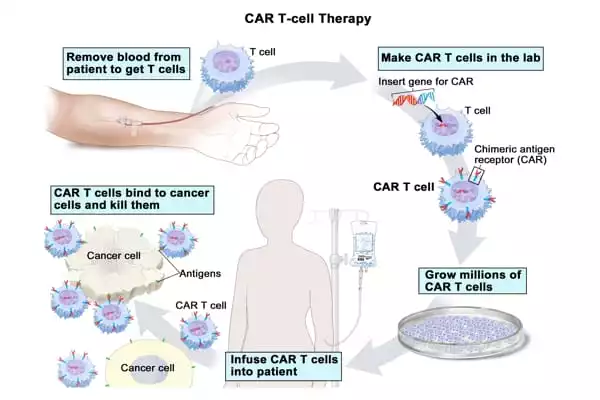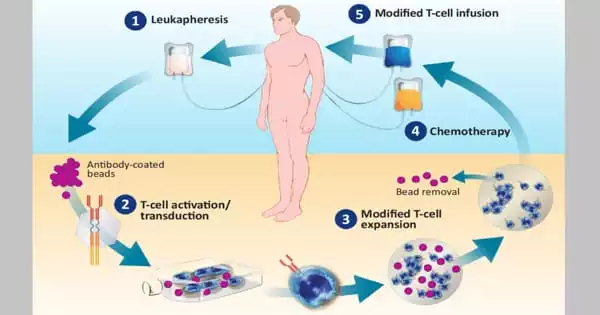A new technique developed by Penn Medicine researchers could reduce the time it takes to modify patients’ immune cells for reinfusion back into the body to detect and kill cancer. The cell production process for this type of immunotherapy, which was pioneered at Penn, CAR T cell therapy, normally takes nine to fourteen days. In a preclinical study published in Nature Biomedical Engineering, researchers at the University of Pennsylvania’s Perelman School of Medicine sped up the procedure and created functional CAR T cells with improved anti-tumor efficacy in just 24 hours.
These findings point to the possibility of drastically reducing the time, materials, and labor necessary to manufacture CAR T cells, which could be especially advantageous in patients with fast-advancing diseases and in resource-limited healthcare settings. The study was headed by Michael C. Milone, MD, Ph.D., associate professor of Pathology and Laboratory Medicine, and Saba Ghassemi, Ph.D., research assistant professor of Pathology and Laboratory Medicine at the Center for Cellular Immunotherapies.
“While traditional manufacturing procedures that require several days to weeks to manufacture CAR T cells continue to work for patients with ‘liquid’ diseases like leukemia, there is still a huge need to lower the time and cost of creating these complex medicines,” Milone added. “The manufacturing method reported in this study is a testament to the potential to innovate and improve the production of CAR T cell therapies for the benefit of more patients, building on our research from 2018 that reduced the standard manufacturing approach to three days, and now to less than 24 hours.”
This innovative approach is remarkable in that it may be able to help patients who might otherwise not be able to benefit from CAR T cell therapy such as those with rapidly progressing cancer due to the significant time currently needed to generate these therapies.
Saba Ghassemi
CAR T cell treatment is a sort of immunotherapy that uses a patient’s own customized immune cells to combat cancer. T cells are extracted from a patient’s blood and modified in the lab by adding a receptor gene (called a chimeric antigen receptor or CAR). The CAR T cells are then reintroduced into the patient to seek out, bind to, and destroy cancer cells. However, if T cells are isolated from the body for an extended period of time during the engineering process, they can lose their ability to multiply, which is critical to their usefulness as a live medication. As a result, the Penn team tried to shorten the process without losing T cell potency.
The researchers discovered that the quality of the CAR T cell product, rather than the number, is a crucial driver of its success in animal models. Their study has shown that a lower number of high-quality CAR T cells created without considerable expansion outside the body outperforms a larger number of low-quality CAR T cells expanded extensively before being returned to the patient.
Traditional manufacturing approaches require T cells to be stimulated (or “activated”) in a way that induces the cells to replicate and expand in number. A key to the Penn researchers’ manufacturing approach is the lentiviral vector that delivers the CAR gene to the T cells. Lentiviral vectors, which are derived from the human immunodeficiency virus (HIV), are able to transfer genes like the CAR to cells without the need for this initial “activation” step, but the efficiency of this process was low.

The Penn researchers devised a method to bypass this requirement for T cell activation and transfer genes directly to non-activated T cells newly extracted from the blood using engineering approaches based in part on an understanding of how HIV naturally infects T cells. This offered the added benefit of speeding up the overall manufacturing process while also preserving T cell potency. Patients are not infected with HIV as a result of this procedure.
Because the medication must be created for each unique patient, the procedure of designing T cells is costly and time-consuming. The team expects that shortening the production time will reduce the cost of the therapy and make it more accessible to more people.
“This innovative approach is remarkable in that it may be able to help patients who might otherwise not be able to benefit from CAR T cell therapy such as those with rapidly progressing cancer due to the significant time currently needed to generate these therapies,” Ghassemi said.
“Efficient reprogramming of T cells with a CAR in as little as 24 hours in a streamlined manufacturing process that does not require T cell activation or lengthy culture outside the body also opens the door to broadening where and when these therapies are generated. It may not only increase the capacity of centralized manufacturing facilities, but if simple and consistent enough, it may be possible to produce these therapies locally near the patient, thereby addressing the many logistical challenges that impede the delivery of this effective therapy, particularly in resource-poor environments.”
This study is a catalyst for more clinical research to investigate how the engineered CAR T cells, through this shortened approach, work in patients with specific cancers.
















